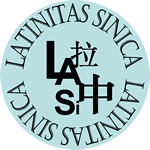Conference on the “Latin translations of Confucius’ Dialogues”
http://www.latinitas.unisal.it/index.php/it/nuntium/353-conference-on-the-latin-translations-of-confucius-dialogues
On January 11th, 2017, prof Michele Ferrero, Director of the Centre for Latin Studies “Latinitas Sinica” of Beijing Foreign Studies University was invited to give a lecture to the students of the Master Degree course at the Faculty of Classics (FLCC) of Salesiana University in Rome.
The conference was part of the continuous exchange and cooperation between the Faculty of Classics (FLCC) of Salesiana University in Rome and the Centre for Latin Studies “Latinitas Sinica” of Beijing Foreign Studies University.
The theme of the conference was: the “Latin translations of Confucius’ Dialogues”. The teaching of Confucius is contained in the so-called Chinese Classics. One of the them is called the “Dialogues” of Confucius (Lun Yu, 論語).
Prof Ferrero explained that exist six main Latin translations of the Dialogues. One from the Jesuit Michele Ruggieri is in a manuscript of 1592. Then in 1685 another Jesuits, Philippe Couplet, and other Jesuits published: Confucius, Sinarum Philosophus, sive Scientia Sinensis latina exposito studio et operâ Properi Intorcetta, Christiani Herdtrich, Francisci Rougemont, Philippi Couplet, PP. Soc. Jesu, (Parigi 1687). In 1711 yet another Jesuits, Francois Noel included the Dialogues in his Latin translation of what he calls “the six classical Chinese texts” (Francisci Noel Sinensis imperii libri classici sex : Nimirum Adultorum Schola, Immutabile Medium, Liber Sententiarum, Memcius, Filialis Observantia Parvulorum Schola Praga, 1711). In 1895 Seraphin Couvreur published “Les quatre livres” , that includes both the French and Latin translation of Confucius. Between 1879 and 1892 the Jesuit Angelo Zottoli published a collection of Chinese classics in Latin : Cursus litterae sinicae neo-missionariis accommodatus . Finally it exists online the William Cheung multilingual Confucius online project, that includes Latin.
By comparing various Latin translations of passages of Confucian Classics, Ferrero showed how different sinologists read Confucius according to their own personal and historical background.
More importantly, by translating Confucius into Latin these scholars of the past introduced him into the Western world in a unique and extraordinary way. Latin is the language of ancient Western wisdom and the meeting between Chinese wisdom and Latin power shines forth in these translations
